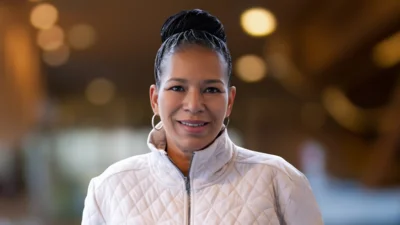Last year, National University of Health Sciences created the Black Naturopathic Opportunity scholarship aimed at increasing the representation of Black/African-American physicians in complementary and alternative medicine. Since then, National University has awarded scholarships to six students who were able to receive 50 percent off tuition for their first and second trimesters of study in the naturopathic medicine (ND) program.
National University caught up with two recent recipients to discuss how they got interested in the profession and their advice for other students of color who are considering a degree in natural medicine.
While researching naturopathic medicine schools, Africa Gaddis first discovered NUHS through the Instagram page of the Black Naturopathic Medical Student Association (BNMSA), a Black student organization on campus.
“The representation of Black people in this school really stood out to me,” she said.
Gaddis now manages the page as social media marketing coordinator for BNMSA, a position that has inspired her to try and raise awareness about naturopathic medicine both as a student and in her future career. She considers naturopathic medicine a niche within the health care field. While everyone might not know about it, she said those interested in the field should not be discouraged about taking a holistic approach within healthcare.
“It’s important not to let people that don’t know naturopathic medicine sway you from the beauty of what it is and what it’s able to afford your future patients,” she said.
One of the things she finds valuable about the profession is its emphasis on educating people in ways that can help improve their health and their overall lives. It is part of the reason why she considers her education at NUHS such a great investment.
“The more knowledge you have, the more you can teach people,” she said.
She’s also interested in exploring how naturopathic medicine is tied into African culture and changing eating habits specific to the Black community to improve longevity. She enjoys using her platform on social media to expose others to naturopathic medicine as well.
For students interested in naturopathic medicine, she recommends reaching out to others in the field and getting comfortable asking questions.
“One thing National did well was following through with all the services that were offered from tutoring to scholarships. Whenever I had a question, they were very responsive,” she said.
Alicia Johnson gained an interest in holistic medicine while completing a clinical internship in Thailand. Compared to her experiences as a pre-med student in trauma centers and emergency rooms in the United States, she noticed distinct differences between the way Thailand treated patients.
“We often had a lot of the same patients with the same symptoms who were just given medication and no answers,” she said.
In Thailand, doctors sought the root cause of the patient’s illness, an approach that really appealed to Johnson. When she started looking for medical schools, she found naturopathic medicine encompassed everything she wanted to do in a future career. She recommends other students, particularly students of color, follow their gut like she did.
“I always thought going into conventional medicine would be more financially secure but you should really ask yourself what your values are,” she said. “Really stick to your beliefs and follow the path that matches how you live your life.”
Since becoming a student in naturopathic medicine last year, Johnson has noticed more people of color are jumping into the field and getting back to their cultural roots, which often involves herbal medicine.
“For people of color, a lot of our foundations are based on this kind of medicine,” she said. “This is where we came from. I feel like we’re actually getting back to that.”
She said getting more people of color involved with the field is especially important because it also attracts more patients of color, who don’t always go to hospitals or see doctors when they need to.
“With more doctors of color, these patients will feel more comfortable receiving care,” she said.
Naturopathic medicine also offers a chance to educate communities-in-need about preventative medicine, setting them up for better long-term health.
“Naturopathic medicine offers a different perspective,” she said. “You’re actually able to teach patients something they can continue to use throughout their life.”





 Alerts Sign-up
Alerts Sign-up